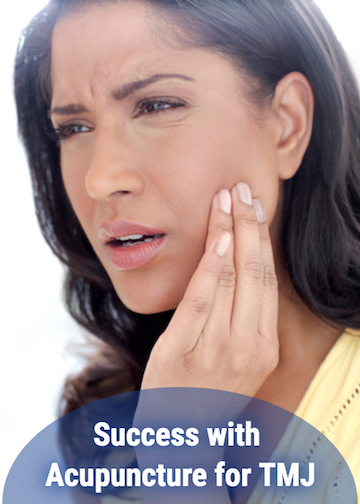Success with acupuncture has been proven in recent studies showing it to be highly effective for TMJ disorder (temporomandibular joint) aiding in the multitude of issues that go along with this type of disorder. According to the National Institute of Dental and Craniofacial Research, about 11-12 million adults in the United States have pain in the temporomandibular joint region. It’s not hard to see why there are many people with TMJ issues. The jaw is something that we use nonstop day after day whether that’s through eating or talking, and even those things that we can’t control like teeth grinding in our sleep.
TMJ Basics
The temporomandibular joint is a double joint structure which attaches the lower part of the jaw to the skull. The reason that this particular joint is so unique, but also has issues, is because it moves in both a hinge action and a slide motion. Additionally, the jaw joint is really two joints, and they cannot move independently but must always work together.
TMJ disorders are divided into 2 groups:
- Myogenous TMD – this is related to the chewing muscle
- Arthrogenous TMD – this is related to the joint itself
Unfortunately, it is not entirely clear what causes TMD, but it is theorized that there is not one certain cause, but a combination of factors.
Potential Causes of TMJ Disorder:
- Structural jaw issues
- Nerve problems
- Arthritis
- Genetics
- Poor diet
- Bruxism (teeth grinding)
- Excessive gum chewing
- Erosion of the joint
- Poor posture
- Jaw injury and/or dislocation
- Lack of sleep
The other issue in western medicine is that there aren’t really definite effective treatment options to attack the issue of jaw pain directly. The largest treatment option, in general, is for stress management or at-home exercises to release the jaw, and NSAID’s to deal with pain management. In more specific or severe cases, there are mouthguards, and even TMJ implants to replace all or part of the temporomandibular joint. TMJ disorders can also trigger headaches or migraines, creating a whole other problem to treat.
Being that a large factor of TMJ disorder, no matter the cause, surrounds around stress, acupuncture is logically the most sound treatment option being that it will treat the cause as well as stress.
Acupuncture for TMJ Disorder
Acupuncture works for TMJ disorder by promoting relaxation within the jaw and rejuvenating the neural pathways. By rejuvenating the neural pathways allows for a decrease in pain over time, and lead to long lasting results. In TCM, TMJ disorder is related to different types of obstruction with patterns such as Liver Qi Stagnation and Wind/Cold Bi Syndrome.
Example pattern potential symptoms:
- Liver Qi Stagnation – a patient with this pattern may present with neck pain, anxiety, tinnitus, headaches, and tension in the facial muscles.
- Wind/Cold Bi Syndrome – a patient with this pattern may present with pain that moves around from one area to another, fever/chills, tinnitus, acute onset of pain, and aversion to cold and wind.
Acupuncture for TMJ disorder helps by:
- Decrease stress – acupuncture releases the muscles of the face and jaw that become contracted when stressed. Additionally, acupuncture treatment regulates the production and release of cortisol and noradrenaline to aid coping with stress more efficiently.
- Relieve pain – acupuncture relaxes the muscles and releases endorphins and serotonin.
- Decrease inflammation – since acupuncture regulates the stress hormones in the body, it in-turn helps control inflammation in the body.
- Enhance the action of the muscles that open and close the jaw – acupuncture does this by stimulating the temporalis muscle to increase the range of motion in the temporomandibular joint.
There are a multitude of both local and distal points that are helpful in treating TMJ disorder used by many licensed acupuncturists as well as in recent studies in acupuncture for TMJ.
Acupuncture points for TMJ disorder:
- ST6 – eliminate wind from the face
- ST7 – beneficial for Liver Wind patterns
- ST45 – release heat and/or move stagnation from the channel
- C4 Huatuo – innervates the areas of the mouth, chin, and jaw
- SJ17 – dispels Wind, benefiting the head/face and ears, and also clears Heat
Although many times TMJ is resolved on its own over times, there are many patients who also find it to be chronic in nature experiencing pain on a daily basis. In this case, it can be best for some patients, depending on their pattern, to introduce an herbal formula in addition to their acupuncture treatment plan.
Most Beneficial Herbs for TMJ Disorder:
- Ginger – aids with sinus and ear pain, and is one of the most soothing herb options for TMJ pain
- Kava Root – calms the nervous system and ease the stiffness in the jaw
- Rosemary – full of antioxidants and is a beneficial anti-inflammatory
- Butterfly Weed – helps with the production of synovial fluid in the joints
- Blue Vervain – relaxes clenched bite
- Agrimony – eases tension in the muscles of the jaw
- Clove – decreases gum swelling from TMJ pain
Many studies in recent years have found acupuncture to be beneficial for TMJ pain. A study from 2017 found that acupuncture reduced TMJ pain, and a study from 2020 found that acupuncture did away with the patient’s painful symptoms.
Acupuncture & TMJ Disorder Treatment
